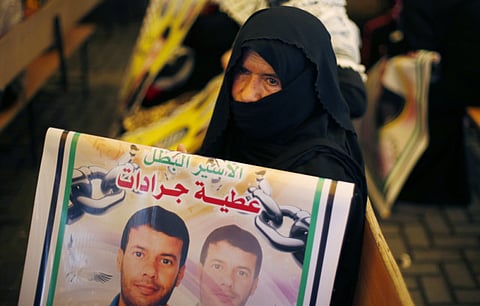Palestinian Ministry for Detainees’ Affairs a sticking point
Presidential decree expected to clear uncertainty about portfolio

Ramallah: Despite last-minute differences between Hamas and Fatah over the dissolution of the post of Minister of Detainees’ Affairs, a Palestinian unity government was formally sworn-in on Monday.
Efforts by the Palestinian National Authority to scrap the position notwithstanding, it was kept open for the time being in an apparent compromise with Hamas in order to ensure its full cooperation and participation in the new government. During the swearing-in ceremony at the Palestinian presidential headquarters (Mukataa) in Ramallah, 17 ministers were officially announced and 14 of them officially sworn in.
Ministers from Gaza were not allowed entry into the West Bank by Israeli occupation forces.
The Detainees’ Affairs portfolio was not officially allocated to the Prime Minister at the ceremony but, according to Zeyad Abu Amr, the Undersecretary of the Palestinian Ministry of Detainees’ Affairs, the ministry will remain operational and unchanged in its work under the Palestinian premier’s supervision.
“The issue of keeping the ministry as a ministry or of changing its leadership to a committee will be decided and declared by a presidential decree expected to be issued shortly,” Abu Amr told Gulf News.
The issue of the Ministry of Detainees’ Affairs had presented a last-minute hurdle for Fatah and Hamas but it was set aside to pave the way for the swearing-in ceremony.
Dr Abdul Sattar Qasim, a political analyst and commentator, criticised the contribution of the Palestinian Ministry of Detainees’ Affairs with respect to Palestinian policies, charging that its policies had caused the national resistance to be viewed from a monetary perspective. “Palestinian prisoners in Israeli jails and their families are paid, as if resisting and struggling against the Israeli occupation occurs only for money,” he told Gulf News. He added that unemployed Palestinians had been joining the resistance on the hope that they would be eligible for a monthly salary once imprisoned.
According to the rules and regulations of the Palestinian Ministry of Detainees’ Affairs, all prisoners in Israeli jails get paid on a monthly basis and those jailed for more than five years qualify for monthly salaries for the rest of their lives and the lives of their dependents.
Dr Qasim, who heads the Political Science Department at Al Najah National University in Nablus, has categorically rejected such policies and blamed them for undermining the public importance of the Ministry of Detainees’ Affairs.
A considerable portion of the Palestinian budget goes to the Ministry of Detainees’ Affair to support Palestinian prisoners. Many international donors consider the prisoners terrorists from an international point of view and have repeatedly urged the Palestinian National Authority (PNA) to drop the prisoners from the PNA budget.
Political analysts have agreed that the PNA has caved in to the demands of the donors and decided to dismantle the ministry and make it subordinate to the Palestine Liberation Organisation (PLO).
“The unity government is a mere stab in the back of the Palestinian resistance. The government doest not have a national base, but it is based on the conditions of the Mideast Quartet,” Dr Qasim stressed.
In a televised speech following the swearing-in ceremony, Abbas announced that the new Palestinian national unity government will honour all the terms and conditions set by the international community, adding that the unity government recognises Israel, renounces violence and honours all previous agreements.
“The peace talks are the business of the PLO and the unity government does not have anything to do with them at all,” he said.
Commenting on the Israeli threats, Abbas warned that the Israeli escalation measures will not pass unanswered. “We will not stand handcuffed. We will use all the diplomatic and political tools at our disposal to confront Israeli threatening measures,” he warned.
Sign up for the Daily Briefing
Get the latest news and updates straight to your inbox



